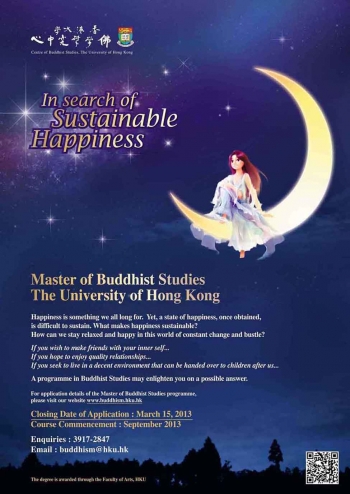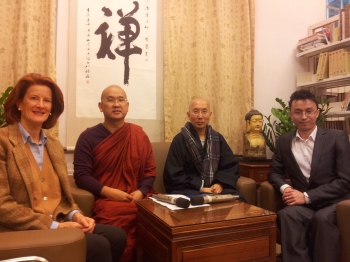Those who have seen the newest poster from The Hong Kong University’s Centre of Buddhist Studies will not necessarily like it. Judging from reactions both online and off, the general reception among staff, students, and the general public has been mixed. From a purely aesthetic point of view, a girl on a crescent moon looks pleasant and attractive. But the overwhelming feedback has gone something like this: it looks neither Buddhist nor academic; it does not even look like an advertisement for a Masters in Buddhist Studies degree. Some might have asked which genius was commissioned to paint this piece of artwork. Others say this was an insult to the hardworking professors and researchers at the Centre. It is true, after all, that they spend day and night studying difficult languages like Pali and Sanskrit to preserve the traditional teachings: perhaps the cartoonish ambience of the poster does not reflect the gravity of their work fairly.
The source of this minor controversy is not a careless or insensitive artist. Nor is it a poorly thought-out PR tactic by a consultant with no awareness of Buddhist imagery or aesthetic. The individual who came up with the poster design was the director of the Centre himself, and Ven. Hin Hung explained his rationale for the poster concept as such: 'Every year, we need to come up with a poster to promote our programme on Master of Buddhist Studies. We have done this for more than ten years now. This year we tried to be a little bit more imaginative, a little more skillful. We used a cartoon image of a young girl sitting on the moon glazing up to our slogan In search of Sustainable Happiness.' He then admitted, 'The reaction to the poster has been mixed. Of course, “sustainable happiness” is another term for nirvanic experience, the only sustainable happiness experience according to Buddhist Teachings. By using the image of the young girl sitting on the moon, we hope to say that we all have that dream to experience sustainable happiness.
'This design obviously is not very traditional. We used it because we want to appeal to those who have a dream for sustainable happiness; either now or when they were young.'
'This design obviously is not very traditional. We used it because we want to appeal to those who have a dream for sustainable happiness; either now or when they were young.'
When I spoke with Ven. Hin Hung about the issue yesterday, he emphasized that he was not that surprised by the mixed reaction. He felt the need to explain its motif and imagery, but he was unapologetic about it and rightfully so. Because even though it was not apparent to us, the theme behind the poster's design conveyed a distinctly moral imperative he had placed upon himself since becoming Centre director. When he clarified to me his specific strategy concerning the direction of the Centre, his usually nonchalant demeanour receded in the face of a calm but passionate desire to adapt Buddhism specifically for the 21st century. I was quite struck: gone was any pretense of keeping Buddhism 'pure' in the literal sense, as if it is either possible or desirable to retain the Buddhism of 2500 years ago. Even as he continually stressed the importance of preserving Pali and Sanskrit (and therefore the traditional texts), he also insisted with undaunted resolve that the Centre has a moral duty to fly with two 'wings' - one carrying traditional Buddhist Studies, the other carrying the burdens and possibilities of our modern world and disciplines.
Ven. Hin Hung's wish to nurture a Buddhism that is neither irrelevant to the future nor an illegitimate New Age movement that has strayed from tradition is based on his moral compass as a monk leading an academic centre in a university. For the past century Buddhism has been taken and used in many disciplines to enrich those same disciplines: philology, Asian history, psychology, psychotherapy, and now, certain sciences like neuroscience. Like other Buddhists, Ven. Hin Hung sees Buddhism as having seen three broad stages of doctrinal interpretation. His argument is that there must be a new kind of (legitimate) Buddhism for the 21st century, a claim perhaps more daring and radical than any poster design. For this new legitimate Buddhism to take hold, it must be willing to learn from other disciplines or dialogue with them. This process had been occuring for many years now, but with the shrinking of underfunded departments in the West (with some exceptions), the Centre's moral duty to its students and the community has never been more urgent.
I contend that the Centre of Buddhist Studies did not make this mission statement apparent enough in their brochure for this academic year, although it is hard to say whether one can or should detail their departmental strategy on a few small pages (or a poster, for that matter). Perhaps it should have been emphasized more clearly that progress and adaptation should only occur when it is built on the solid foundation of tradition. This is why the study of the great Buddhist languages have always been a priority to Ven. Hin Hung, and it will remain so.
But if this first priority is given its necessary due, as Ven. Hin Hung indeed has, then it follows that the Centre has a moral duty to become the cosmopolitan destination of learning for everything Buddhist; be it palliative care, counselling, psychology, or contemporary issues like bioethics. Ven. Hin Hung and the Centre need to sing the strengths of their mission more proudly and loudly: they are stewards of the tradition, but they are also trailblazers of the future evolution of Buddhism.
Venerable Sik Hin Hung on the Master of Buddhism Programme at The University of Hong Kong from buddhistdoor on Vimeo.
















